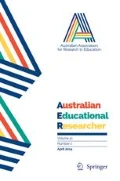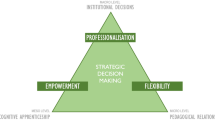Speaking the word is not a true act if it is not at the same time associated with the right of self-expression and world-expression, of creating and re-creating, of deciding and choosing and ultimately participating in society’s historical process. (Paulo Freire 1972b, p. 30).
Abstract
Teacher education is in a state of uncertainty around the world including the more wealthy and less wealthy countries. If it is generally accepted that teacher education can make a difference in the educational lives of all students regardless of cultural and educational background, then how exactly to arrange the detail of schooling is not. Under particular circumstances, schooling that is primarily concerned with reproducing the values and practices of the market economy and privileged minority, suggests that most likely teacher education will submit to economic power and not make a difference. Schooling of this type participates in the rearticulation and sometimes further penetration of social hegemonic practice. On the other hand, if schooling within the dominate economy and values sets about establishing the conditions whereby the majority of students are encouraged to investigate significant knowledge, social constructs and cultural scaffolds critically, imaginatively and independently then teacher education structured in the same way can make a difference, contributing to authentic community building and social change. Drawing inspiration from the work of Paulo Freire, this paper describes the efforts of teacher education in Australia grappling with these tensions and contradictions within the constraints of university and school requirements, as well as a strongly neoliberal economy. It briefly outlines a history of partnership-based and practice-based pre-service teacher education that has generated support for on-site approaches of various types. Moving beyond Pedagogical Content Knowledge, the paper explores the conditions for a new concept of philosophical project knowledge that theorises teacher education as learning through social action and partnerships between communities, schools and universities. In this way, education is seen as a democratic right and a process of liberation for all citizens especially those marginalised and excluded within a market economy.

Similar content being viewed by others
References
Arnold, J., & Edwards, T. (2009). Crossing borders––Teacher Education in context––putting pedagogy in its place. Paper presented at ‘Teacher Education Crossing Borders: Cultures, contexts, communities and curriculum’, Albury, 28 June–1 July.
Arnold, J., Edwards, T., Hooley, N., & Williams, J. (2010). Theorising on-site teacher education: Philosophical project knowledge (PPK). Asia-Pacific Journal of Teacher Education, 40(1), 67–78.
Ball, S. J. (2011). New voices, new knowledges and the new politics of education research: The gathering of a perfect storm? European Educational Research Journal, 9(2), 124–137.
Ball, S. J. (2012). Global education inc: New policy networks and the neo-liberal imaginary. London: Routledge.
Ball, A. F., & Tyson, C. A. (Eds.). (2011). Studying diversity in teacher education. Washington: AERA.
Brookfield, S. (1995). Becoming a critically reflective practitioner,. San Francisco: Jossey-Bass.
Cacciattolo, M., & Cherednichenko, B. (2007). Initiating active professionals; Rethinking philosophy practice and engagement in teacher education. Paper presented at the Annual Meeting of the American Education Research Association, Chicago, April 9–13.
Cochrane-Smith, M., & Zeichner, K. (Eds.). (2005). Studying teacher education: The report of the AERA panel on research and teacher education. Washington: AERA.
Day, C. (1999). Researching teaching through reflective practice. In J. J. Loughran (Ed.), Researching teaching: Methodologies and practices for understanding pedagogy. London: Falmer.
DEECD. 2011. Effective schools model: School effectiveness Retrieved may,2011, from http://www.le.ac.uk/education/ESI/doc1f.html.
Dewey, J. (1966). Democracy and Education: An introduction to the philosophy of education. New York: Free Press.
Dewey, J. (1997). How we think. Mineola, New York: Dover Publications Inc.
Freire, P. (1972a). Cultural action for freedom. Harmondsworth: Penguin.
Freire, P. (1972b). Pedagogy of the oppressed. Australia: Penguin.
Henning, E., & Gravett, S. (2011). Pedagogical craft and its science: Janus-faced in pre-service teacher education. Education As Change, 15(S1), S21–S33.
Kemmis, S., & McTaggart, R. (2005). Participatory action research: Communicative action and the public sphere. In N. Denzin & Y. Lincoln (Eds.), Handbook of qualitative research (3rd ed.). Thousand Oaks, California: Sage.
Kemmis, S., & Smith, T. J. (2008). Praxis and praxis development. In S. Kemmis & T. J. Smith (Eds.), Enabling praxis: Challenges for education (pp. 3–13). Rotterdam/Taipei: Sense Publications.
Kincheloe, J. L. (2008). Critical pedagogy primer (2 nd Ed.). New York: Peter Lang.
Kruger, T., & Cherednichenko, B. (2006). Social justice and teacher education. International Journal of Learning, 12(7), 321–332.
Kruger, T., Davies, A., Eckersley, B., Newell, F., & Cherednichenko, B. (2009). Effective and sustainable University–School partnerships: Beyond determined efforts by inspired individuals. Canberra: Teaching Australia.
Loughran, J. J., & Russell, T. L. (Eds.). (2002). Improving teacher education practices through self-study. London: Routledge-Falmer.
McKinsey & Company. (2007). How the world’s best-performing school systems come out on top, September 2007. London: McKinsey & Company.
NCATE. (2011). Transforming teacher education through clinical practice: A national strategy to prepare effective teachers, Report of the Blue Ribbon Panel on clinical preparation and partnerships for improved student learning, National council for accreditation of teacher education, Retrieved from http://www.ncate.org/LinkClick.aspx?fileticket=zzeiB1OoqPk%3d&tabid=715.
PISA. (2009). OECD programme for international student assessment. http://www.oecd.org/Pisa/pisaproducts/pisa2009. Accessed July 2012.
Reid, J. (2011). A practice turn for teacher education? Asia-Pacific Journal of Teacher Education, 39(4), 293–310.
Shulman, L. (1987). Knowledge and teaching: foundations of the new reform. Harvard Educational Review, 57, 1–22.
Shulman, J. (1992). Case methods in teacher education. New York: Teachers College Colombia University.
Smyth, J. (2012). The socially-just school and critical pedagogies in communities put at a disadvantage. Critical Studies in Education, 53(1), 9–18.
Thomassen, L. (2010). Habermas: A guide for the perplexed. London: Continuum.
Wenger, E. (1998). Communities of Practice: Learning, meaning and identity. Cambridge: Cambridge University Press.
Author information
Authors and Affiliations
Corresponding author
Rights and permissions
About this article
Cite this article
Arnold, J., Edwards, T., Hooley, N. et al. Site-based teacher education for enhanced community knowledge and culture: creating the conditions for ‘philosophical project knowledge’. Aust. Educ. Res. 40, 61–75 (2013). https://doi.org/10.1007/s13384-012-0070-z
Received:
Accepted:
Published:
Issue Date:
DOI: https://doi.org/10.1007/s13384-012-0070-z



